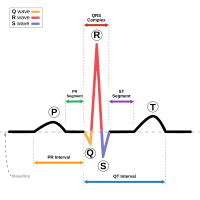
Photo from wikipedia
Prolonged total atrial conduction time is caused by atrial remodeling. Left atrial remodeling is associated with poor outcome in patients with heart failure (HF). This study aimed to investigate whether… Click to show full abstract
Prolonged total atrial conduction time is caused by atrial remodeling. Left atrial remodeling is associated with poor outcome in patients with heart failure (HF). This study aimed to investigate whether prolonged total atrial conduction time predicts poor prognosis in patients with HF. We performed transthoracic echocardiography in 100 patients (65 men; mean age 68 ± 13 years) who were hospitalized for HF. Total atrial conduction time was defined as the duration from P wave onset on electrocardiography to peak A′ wave on tissue Doppler imaging (TDI) echocardiography (PA-TDI duration). There were 37 cardiac events (37%) during a median follow-up period of 414 days. The PATDI duration was significantly longer in patients with cardiac events than in those without (150 ± 18 ms vs 133 ± 19 ms; P < 0.05). There were no significant differences in left ventricular end-diastolic dimensions and ejection fractions between patients with and without cardiac events. Patients with HF were divided into 3 groups according to tertiles of the PA-TDI duration. Kaplan–Meier analysis showed that the highest tertile of PA-TDI duration was associated with the greatest risk among patients with HF. Multivariate Cox proportional hazard analysis showed that the PA-TDI duration was an independent predictor of cardiac events, leading to the conclusion that prolonged PA-TDI duration was a feasible predictor of cardiac prognosis in patients with HF.
Journal Title: Heart and Vessels
Year Published: 2019
Link to full text (if available)
Share on Social Media: Sign Up to like & get
recommendations!